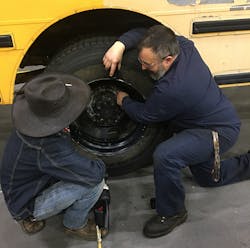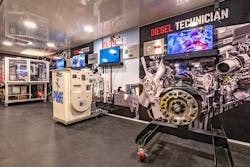This is Part 2 of a 5-part series on the trucking tech shortage and the strategies to combat it. Read Part 1 here.
Twenty years ago, finding a good maintenance technician at McKee Foods, known for its delectable Little Debbie products, was a piece of cake. Once a job was posted, a stack of applications would immediately pile up on the recruiter’s desk.
Now they are lucky to have one applicant to service their Volvo fleet, said Tyson Sontag, a senior truck technician for the company’s fleet in Gentry, AR, a bastion for trucking, with J.B. Hunt’s and Walmart’s headquarters nearby.
He should know, as he was hired 20 years ago and is objectively the cream of the snack manufacturer’s crop of mechanics.
In 2006, he was named grand champion of the American Trucking Associations' Technology & Maintenance Council TMCSuperTech skills competition, as well as the HDAW Awards Technician of the Year, so he certainly ranks among the nation’s best as well.
His ability to get trucks back on the road directly relates to the brand’s popularity and continued success.
“Uptime is so important,” Sontag said. “If you can’t fill your shelf space, someone else will.”
He has some ideas on what could be causing the technician retention problem.
“This is one of those fields where you have to prove yourself,” said Sontag, who absorbed nearly every piece of TMC literature he could to prep for the skills competition 14 years ago. “It’s a slow climb to the top, and there are other things that seem to pay better that draw them away.”
The average pay nationally for a maintenance tech in the trucking industry is $49,150, according to the Bureau of Labor Statistics. Sontag said McKee does offer competitive wages.
One other thing the company does is invest in its own destiny. In 2016, the company asked Sontag to start teaching diesel technology to high school students at the Gentry Career and Technical Education Center, which itself was created by the community asking McKee what it needed to thrive. They said diesel techs. Voters approved a mill increase and the facility, which also trains nursing and healthcare workers, was built. McKee paid his teaching salary for the first two years and now the school signs those paychecks.
TMC treasurer Kenneth Calhoun, (featured in Part 1), at the time vice president of customer relations at Truck Dealers of Arkansas, was at the opening of the facility, which features a 5-ton jib crane to lift engines for semis, lamenting to the local paper how his fleet needed 20 new techs and could use 50.
Sontag, now in year three, arrives at McKee at 4:30 a.m. every weekday for a full shift before heading out to the school at 1 p.m. to teach 15 students for two class periods.
With this master mechanic teaching them, these students in particular have as good a chance as any to become those quality techs Arrants said were lacking.
Sontag’s education began long before he went to an Oklahoma vo-tech in 1988. He started helping his father, also a diesel mechanic, on side jobs at a young age. Sontag’s wage for helping was an obligatory stop at McDonald’s afterwards. Fixing diesels was the family business for awhile, as Sontag’s grandfather had also worked in the trade since World War II.
He can also stress to the students the value of continuous education.
“Ninety-five percent of what I learned in 1988 is obsolete,” he said. “Everything has changed so much.”For one, he’s not also working on steer manure-covered tractors for farmers. And two, the obvious role changes to complexity of parts such as diesel particulate filters and selective catalytic reducers to reduce emissions.
Sontag also stressed that maintaining a fleet is a team effort. Not every tech will be an expert on every part of the truck. While McKee wants all techs to receive cross-training and have a working knowledge, it wants each worker to excel at three specific areas. After some plying, the modest Sontag acknowledged his best areas were overhauls, emissions, and PM work.
Besides teaching the basics of brakes, engines, suspensions, and electrical, Sontag broadens students’ understanding of the industry, and that they could have careers fixing garbage trucks or buses for the city or work trucks for a construction company. He makes students spec out a truck for each industry and vocation.
Sontag never advocates what job to pick, though, or any.
“I let the industry try to sell itself,” Sontag said. Each semester he shuffles in various guest lecturers, from dealerships such as Summit Truck Group; MHC Kenworth/Volvo in Springdale, AR; and a nearby Freightliner dealer to explain what they do to the 30 or so students in the Gentry program.
He said the dealers he has worked with are “very willing to help” out students over 18 with shadowing and mentorship.
A student from Sontag’s 2016 class now works at McKee, and it’s fair to assume the new tech will be a quality hire. That’s one job down, and a lot to go.
“There is going to be some pain down the road if we don’t start increasing the numbers,” Sontag said.
But Arkansas alone will need a lot more truck technicians. According to Trey Lamberth, director of communications at Be Pro Be Proud, the state’s industrial workforce initiative, there are 320 annual openings and that should increase 12% by 2026. The median pay is about $38,000, and the top 10% make closer to $60,000, Lamberth said.
Industry overall is in dire need. “Eighty-four percent of manufacturers report a moderate or serious shortage of skilled production workers,” Lamberth said.
“Over 20% of the current technical professionals are at or near retirement age,” Lamberth said, referring to national numbers. “That’s a huge number for us right now.”
Because of the crunch, many retirement-age workers are slow-walking their exit. Sontag’s dad retired but still works two days a week.
“He fixes what he wants to do, but the guy just was scared to lose access to that knowledge,” Sontag said.
This article originally appeared on FleetOwner.com.
About the Author

John Hitch
Editor-in-chief, Fleet Maintenance
John Hitch is the award-winning editor-in-chief of Fleet Maintenance, where his mission is to provide maintenance leaders and technicians with the the latest information on tools, strategies, and best practices to keep their fleets' commercial vehicles moving.
He is based out of Cleveland, Ohio, and has worked in the B2B journalism space for more than a decade. Hitch was previously senior editor for FleetOwner and before that was technology editor for IndustryWeek and and managing editor of New Equipment Digest.
Hitch graduated from Kent State University and was editor of the student magazine The Burr in 2009.
The former sonar technician served honorably aboard the fast-attack submarine USS Oklahoma City (SSN-723), where he participated in counter-drug ops, an under-ice expedition, and other missions he's not allowed to talk about for several more decades.


